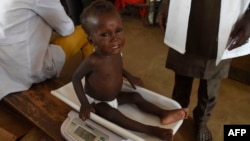Doctors Without Borders, also known by its French acronym MSF, says it recorded an alarming 23,000 cases of severe malnutrition in Nigeria’s Bauchi state between January and June this year — a 120% increase over the same period a year before.
The group on Tuesday also said overall malnutrition in the West African nation increased by 40% nationwide and warned that without immediate intervention, the situation could become catastrophic.
Thierry Boyom, MSF's medical coordinator, said poverty is a key driver of malnutrition but not the only reason why the numbers are surging.
"From the feedback we got, a lot of them were complaining about the significant increase in the prices of basic food items compared to last year, so they can't afford three meals per day,” Boyom said. “[Also] the lack of access to health care and water. There are a lot of health facilities but they're not fully functional because of lack of supply. Also we observe poor infant-feeding practices by the mothers. Vaccination coverage in Bauchi is a bit low, leading to diseases such as measles, a big driver of malnutrition.”
MSF has been responding to the malnutrition crisis in Bauchi since 2022. The group said its treatment centers and personnel are overstretched and they are trying to make room for more sick children.
Nigeria has the second highest burden of growth-stunted children in the world, according to UNICEF, the United Nations Children’s Fund.
UNICEF said malnutrition is the direct or underlying cause of 45% of all deaths in the country under the age of 5.
For years, Nigeria has been embroiled in a protracted war with armed gangs who often kidnap farmers and hold them for ransom.
The resulting loss of food production, along with general insecurity and rising food prices, have hampered the ability of vulnerable people to buy food. The situation is especially bad around July and August each year — the so-called peak of the lean season when food from previous harvests normally runs out.
Abubakar Saleh, Bauchi state nutrition officer, said authorities are working to bring the number of malnourished children down.
"We're trying to scale up micro-nutrient supplementation for pregnant mothers, that is to start preventing malnutrition from the mother, for them to have healthy pregnancies,” Saleh said. “And also in the area of treatment, we have interventions support by USAID-Ukraine for the management of severe acute malnutrition. And also, we're doing maternal, newborn and child health week — it's a campaign and through that campaign we screen children for malnutrition."
Last month, MSF launched a community-based intervention known as Integrated Community Case Management in eight villages and equipped local women with early testing tools to help them detect malnutrition faster.
Boyom said it is bridging the gap.
"They were trained to be able to identify malnutrition, signs of severity or medical complications. But also, they were trained to manage on the spot the cases of simple malnutrition. On top of that they're also trained to manage malaria," Boyom said.
But until insecurity is addressed and there's more funding to help the vulnerable, many more children will be struggling to survive.




